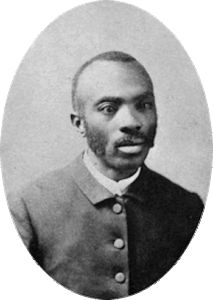
Elijah Marrs
*This date in 1840 is celebrated as the birth date of Elijah Marrs, a Black soldier, minister, and educator.
Elijah P. Marrs was born into slavery in Shelby County, Kentucky, to Andrews and Frances Marrs. His father, Andrew, had been granted his freedom by his master before Elijah was born, but his mother was still a slave and, with her sons, was owned by a man named Jesse Robinson. His parents were born in Culpeper County, Virginia. He had one brother, Henry C. Marrs.
At eleven, he converted to the Baptist religion and received a basic education, studying at night under Ham Graves, a Black man, and later at Sunday schools. When the American Civil War started, Marrs read newspapers to other slaves, keeping people informed about the war's progress.
On September 25, 1864, Marrs organized a company of 27 men armed with clubs, and Marrs armed himself with a broken pistol, marched 22 miles to Louisville, and enlisted in the United States Army. Soon after, he became Company L's sergeant of the 12th Regiment Heavy Artillery U.S. Colored Troops. He may have been initially assigned to another regiment but was transferred and promoted when it was discovered he was literate. He temporarily held the position of regimental quartermaster sergeant. His brother, Henry, became an orderly sergeant and then sergeant major in another company, Company C of the 5th United States Colored Cavalry. His regiment trained at Camp Nelson, Kentucky, and took part in minor engagements at Glasgow and Big Springs in Kentucky in 1865.
With his captain's permission, Marrs and another soldier, Swift Johnson, led prayer meetings in the barracks while the regiment was stationed in Bowling Green. While serving at Camp Nelson, Marrs started a relationship with a woman named Emma, who later died in a refugee camp. He was discharged on April 24, 1866. Career After the war, he and his brother formed a partnership consisting of a drayage business and a farm. In September 1866, Marrs was hired to teach at a school in Simpsonville. Marrs also taught at schools in LaGrange, New Castle, and Louisville. An important part of his work was fundraising. He played a role in various Loyal Leagues organized for the protection of Blacks against attacks by the Ku Klux Klan and himself fended off numerous attacks.
He was secretary of the Loyal League in Lagrange, organized by W. L. Yancey in 1869. While at New Castle in 1871, Marrs helped organize a Henry County Loyal League. In his autobiography, Marrs states that he "slept with a pistol under my head, an Enfield rifle at my side, and a corn knife at the door." On August 3, 1871, he married Julia Gray of Shelbyville, Kentucky. Julia died in April 1876. Marrs also joined the Baptist clergy. On June 16, 1873, he was licensed to preach at the New Castle Baptist Church and ordained on August 22, 1875.
Marrs was a delegate to the first educational convention held in Kentucky in 1868 and the 15th Amendment political convention in 1869. At that convention, he was on the committee on resolutions. He was a member of the Republican party and attended the convention that nominated John Marshal Harlan for governor in 1871. In the fall of 1874, Marrs taught at Roger Williams University in Nashville, Tennessee. In 1875, he was elected as messenger of the General Association of Kentucky Baptists. In 1879, he and his brother Henry co-founded Simmons College of Kentucky and served as the first president, and Henry was the principal.
The school opened on November 24, 1879. The pair felt they were not qualified for the work, and when they and the trustees heard William J. Simmons speak at the school in June 1880, Simmons was offered the position of president and assumed the position in September 1880. Later in his career, he continued participating in statewide and national organizations. He was a member of the State Convention of Colored Men in Lexington in 1882 and the National Convention of Colored Men in Louisville in 1883. He was also a member of a large education convention in Frankfort, Kentucky, in 1884. He was a member of the executive board and treasurer of the General Association of Colored Baptists for six years. He was a member and secretary of the executive board of the Central District Association.
On March 16, 1880, he became pastor of the Beargrass Baptist Church. In 1881, he served as pastor of St. John Baptist Church in Louisville, where he served as well as at Beargrass until his death. Elijah Marrs died on August 30, 1910. He was buried in Greenwood Cemetery.